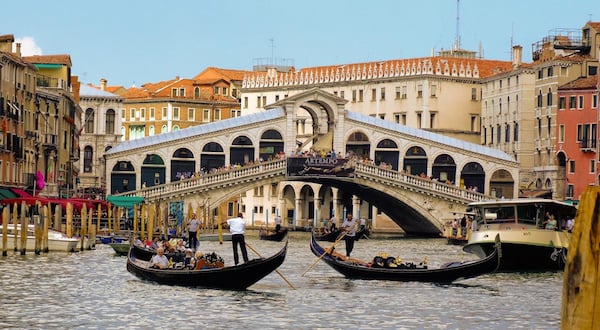Art & Exhibitions
Italians Sell Off Rialto Bridge Advertising Space During Venice Biennale For €5 Million
At €5 million, it's a bargain!

Photo via: Flickr
At €5 million, it's a bargain!

Lorena Muñoz-Alonso

Works to restore the famous Rialto Bridge, built in 1588, have begun in Venice, just days before the crowds attending the 56th Venice Biennale begin to arrive, El País reports (The 2015 Venice Biennale List of Artists Is Out—See Our Exclusive).
The Renaissance bridge—the oldest in Venice’s Grand Canal—is undergoing a complex restoration that is expected to take 18 months to complete and will entail the partial closing of its stairs.
The refurbishment of the Rialto Bridge is being funded by fashion tycoon Renzo Rosso, president of OTB Group, which owns the brands Maison Margiela, Marni, and Diesel among many others.
Rosso has pledged €5 million to the Rialto project, on condition that the scaffolding covering the bridge will be installed by May 1 and display billboards promoting OTB Group brands. With the Venice Biennale preview kicking off on May 6, it’s hard to think of a better advertising spot (see Venice Biennale Curator Okwui Enwezor on “All the World’s Futures,” Karl Marx, and The Havana Biennial Boycott).
In cash-strapped Italy, coming up with the resources to fund major renovations hasn’t been easy. In the last year, a number of private donors have stepped in to provide the funds needed to preserve Italy’s heritage (see Luxury Brands Fund Restoration of Italy’s Monuments, Uffizi to Reopen Eight Renaissance Rooms After Ferragamo Gift and Bulgari Will Foot the Bill for the Renovation of Rome’s Spanish Steps).
The bridge is mostly made of Istrian stone, a durable type of limestone quarried locally. “Istrian stone is a solid material, but delicate at the same time, because when water permeates it, it runs the risk of breaking,” Elizabetta Ghittino, one of the restorers in the team, told El País.
The alarming condition of the bridge became clear in the summer of 2011, when the 140 small columns that support the banister collapsed.
In 2013, the city council commissioned a report, which revealed that—while the bridge is not at risk of collapsing—the area around the adjacent Camerlenghi Palace has sunk 25 centimeters since it was first built.